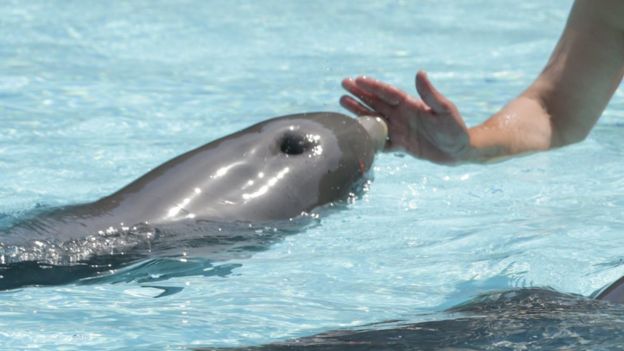Scientists working with dolphins at a marine park near Paris have attempted to measure how the animals feel about aspects of their lives in captivity.
In what researchers say is the first project to examine captivity "from the animals' perspective", the team assessed what activities dolphins looked forward to most.
They found that the marine mammals most keenly anticipated interacting with a familiar human.
The results, they say, show that "better human-animal bonds equals better welfare".
The study, published in the journal Applied Animal Behaviour Science, was part of a three-year project to measure dolphin welfare in a captive setting.
Lead researcher Dr Isabella Clegg worked at Parc Astérix, a theme park with one of France's largest dolphinariums.
With colleagues at the University of Paris animal behaviour lab, she designed experiments to decode dolphin behaviour - essentially looking for physical postures that indicate how the animals were feeling.
"We wanted to find out what activities in captivity they like most," Dr Clegg told the BBC.
 EPA
EPA
To work this out, she tested three activities: a trainer coming and playing with dolphins; adding toys to the pool; and a control, which meant leaving the dolphins to their own devices.
"We found a really interesting result - all dolphins look forward most to interacting with a familiar human," Dr Clegg said.
The animals showed this anticipation by "spy hopping", the action of peering above the surface and looking in the direction that trainers usually approached from.
The dolphins would also increase their level of activity in the pool and spend more time at the edge.
"We've seen this same thing in other zoo animals and in farm animals," said Dr Clegg, adding: "Better human-animal bonds equals better welfare."
A 'happy' social life
The question of whether it is right or wrong to hold these animals in captivity has long been a point of contention, particularly in France.
The French government recently overturned a proposed ban on the captive breeding of dolphins in marine parks such as Parc Astérix.
The lifting of that ban was a huge relief for Birgitta Mercera, who runs the dolphinarium. She told the BBC that allowing the dolphins to breed, to raise their own offspring, was a critical part of what she suggested was a happy - though very different - life from that in the wild.
"I think that wild dolphins are happier in the wild, and captive-born dolphins are much happier in captivity.
"They're born here - it is their life. And it's our priority to look after them."
Enthusiastic display
Talking to Ms Mercera and the trainers at Parc Astérix - who clearly adore the dolphins - and observing the aquatic mammals, it is easy to conclude that they have happy lives.
Their leaping from the water during training sessions, and their curious approaches to the edge of the pool appear to be enthusiastic.
But Dr Susanne Schultz from the University of Manchester, who has studied the social behaviour of wild marine mammals, points out that the study cannot tell us "if a dolphin in captivity is happier than it would be if it was in the wild".
"I do think it's a valuable finding that dolphins in captivity potentially seek out contact with humans," Dr Schultz added.
"And I think that finding can be applied to how we manage other charismatic, intelligent species.
"But just because a dolphin interacts with you doesn't mean that it would choose that lifestyle if it was given a choice.
According to the UK charity Whale and Dolphin Conservation, there are at least 3,000 cetaceans - the group of "toothed whales" that dolphins belong to - in captivity in 50 countries around the world.
Dr Clegg estimates that there could be as many as 5,000, as some animals are not officially registered.
In addition, in the more than 150 years since the first whales and dolphins were brought from the wild and into aquariums, scientists have learned a huge amount about their intelligence and complex social lives.
Dr Clegg says that, rather than answering the question of whether it is right or wrong to have these animals in captivity, she hopes the findings will help improve the lives of those thousands of animals that will spend their lives in dolphinariums.
"I think the question of whether they should be in captivity is really important and we should be asking it at the moment," she says.
"And it has two elements: are the animals in good welfare? And what is their purpose? And we have to look deeper into the animals' behaviour to understand how they're feeling.
"But even if they are in good welfare, we need more research to ensure that their presence is really engaging people with conservation. If they're just here for our entertainment, that can't be justified."
